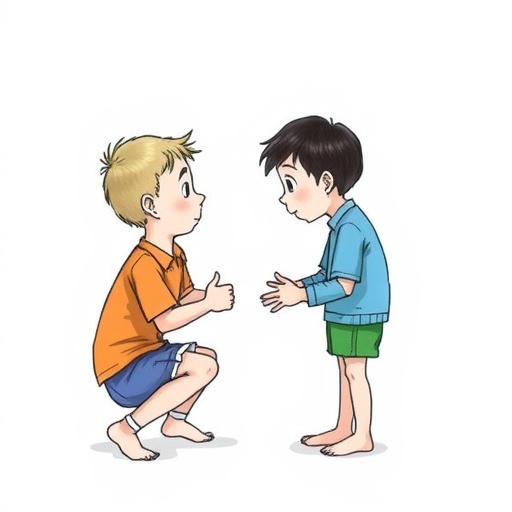The impact of parental bonding during childhood and adolescence has long been a subject of interest for psychologists and researchers alike. In a groundbreaking study conducted by Zoumboulis, Mansour, and Francis, the authors delve deeply into the intricacies of men’s recollections of parental bonding and its subsequent associations with feelings of shame during adulthood. The study has recently been published in the journal Discover Psychology, offering a profound insight into the psychological implications of early familial relationships and the long-lasting effects they hold on emotional health.
The researchers set out to analyze the influence of parental bonding experiences on shame, a complex emotion that can significantly affect a person’s mental and emotional well-being. Through a comprehensive methodology and a well-structured survey, the study collected data from a diverse group of male participants. They were asked to reflect on their childhood and adolescent experiences with their parents, allowing for a rich examination of parental bonding dynamics.
A crucial finding of the study highlights how positive parental bonding tends to foster emotional resilience in adulthood. Men who reported strong, supportive relationships with their parents during their formative years exhibited lower levels of shame and higher self-esteem in their adult lives. This correlation underscores the importance of nurturing and open relationships between parents and their children, as these early interactions can shape emotional health for years to come.
Conversely, men who recounted negative bonding experiences—characterized by emotional distance, neglect, or outright hostility—often reported an increased prevalence of shame. Such experiences are linked to various psychological challenges in adulthood, including anxiety, depression, and social withdrawal. The emotionally charged nature of parental bonding becomes evident through this research, illustrating how deep-seated feelings from childhood can echo throughout a person’s life trajectory.
Furthermore, the authors draw on existing psychological theories to explain these patterns, citing attachment theory as a foundational aspect of their analysis. According to attachment theory, the emotional bonds formed with primary caregivers serve as a blueprint for future relationships. A secure attachment fosters confidence and healthy interdependence, while an insecure attachment might lead to difficulties in forming bonds and a pervasive sense of inadequacy.
The study further investigates the role of cultural factors in shaping parental bonding experiences among men. It acknowledges that familial structures, cultural expectations, and societal norms can all influence how parental relationships are perceived and experienced. Differences in bonding styles across various cultures can play a pivotal role in how shame is internalized and expressed, highlighting a complexity that is often overlooked in psychological studies focused predominantly on Western contexts.
As the study unfolds, it becomes evident that men are often socialized to suppress their emotional vulnerabilities, forcing them to mask feelings of shame rather than confront and understand them. This cultural reinforcement of stoicism can lead to significant mental health issues, as individuals may avoid seeking help or discussing their emotional experiences. The stigmatization of discussing shame in men illustrates a broader societal challenge that requires attention and intervention.
The researchers also emphasize the potential for therapeutic interventions to ameliorate feelings of shame arising from difficult parental bonding experiences. Therapeutic practices such as cognitive-behavioral therapy and emotion-focused therapy can provide individuals with strategies to unpack their feelings of shame and redefine their narratives surrounding past parental relationships. By understanding the origins of their shame, individuals may become empowered to heal and develop healthier self-perceptions.
The implications of this study are significant not only for psychological research but also for practitioners in the field. Mental health professionals are encouraged to consider the historical contexts of their clients’ family backgrounds when addressing issues of shame. By integrating discussions about parental bonding into therapy sessions, practitioners can help clients make connections between their past and their current emotional states.
Furthermore, the findings point to the importance of promoting healthy parenting practices as a preventive measure against emotional difficulties in adult life. Parents are encouraged to cultivate environments that foster open communication, emotional support, and positive reinforcement. Such steps can ensure that the next generation develops a healthier relationship with their emotions and a more robust self-esteem.
In conclusion, Zoumboulis, Mansour, and Francis have shed light on a critical aspect of psychology that reverberates through generations. By connecting childhood parental bonding experiences to adult shame, this study opens avenues for further exploration and highlights the enduring effects of our early relationships. As mental health awareness continues to grow, understanding these dynamics can lead to more effective support systems and interventions for those grappling with the shadows of their past.
By addressing the often-taboo subject of shame, especially among men, researchers like these are paving the way for a healthier discourse around vulnerability and self-acceptance. The findings ultimately advocate for a culture that recognizes the vital importance of nurturing parental relationships—a notion that has far-reaching implications not only for psychology but for society as a whole.
Subject of Research: The impact of childhood and adolescent parental bonding on shame in adulthood among men.
Article Title: Men’s recollections of child and adolescent parental bonding and prospective associations with shame in adulthood.
Article References:
Zoumboulis, G.A., Mansour, K.A., Francis, L.M. et al. Men’s recollections of child and adolescent parental bonding and prospective associations with shame in adulthood.
Discov Psychol 5, 53 (2025). https://doi.org/10.1007/s44202-025-00369-w
Image Credits: AI Generated
DOI: 10.1007/s44202-025-00369-w
Keywords: parental bonding, shame, emotional health, childhood experiences, attachment theory, therapeutic interventions.




